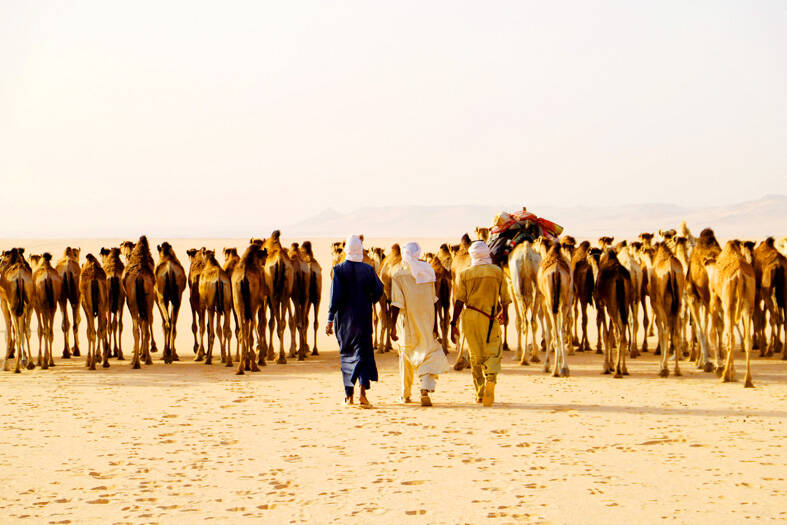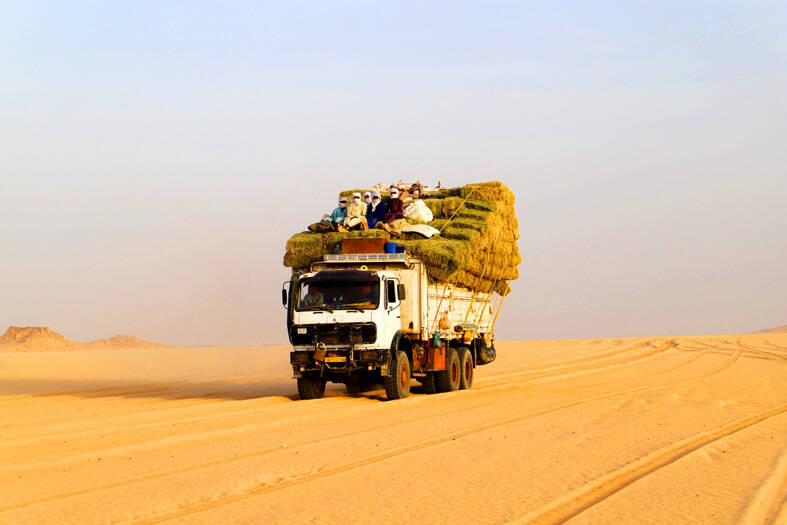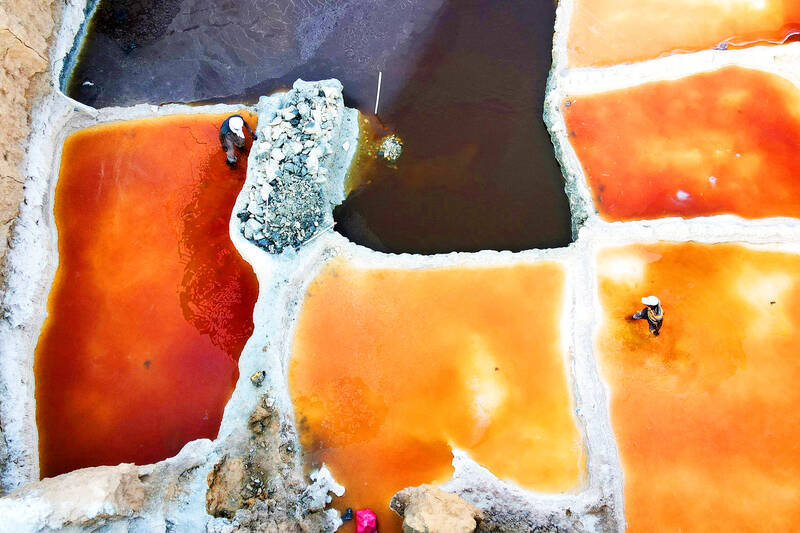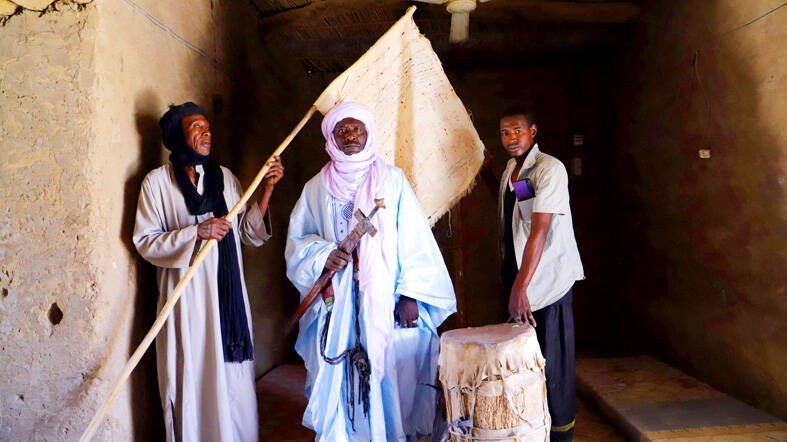At the edge of an oasis almost engulfed by the dunes, where the rare caravan still passes, is a desert landscape punctured by holes.
The salt pans of Kalala, near Bilma in northeastern Niger, were once an essential stop for traders with their swaying lines of camels.
Salt digging, carried on from generation to generation, was a thriving business, involving a commodity so precious that it was bought and sold across the Sahara and beyond.

Photo: AFP
Today, in this isolated desert region plagued by armed gangs and smugglers, the diggers struggle to survive.
Over centuries, hundreds of pits have been dug by hand and then filled with water to leach salt from the local rock.
Standing in the black and ochre pits, Ibrahim Tagaji and a colleague were wrestling with a crowbar to harvest the bounty — a method of extraction that essentially remains unchanged over time. A blisteringly hot day, when the temperatures reached 45°C in the shade, was coming to a close.

Photo: AFP
Barefoot in brine swimming with crystals, the two men dug out salty chunks and pounded them into grains, which were then scooped out with a gourd.
They then poured the salt into molds made from date palms, forming slabs that were then ready for sale.
It is punishingly hard work, rewarded by an income that fluctuates according to whichever buyers happen to pass through town.

Photo: AFP
“When someone with money comes, you earn a lot,” Tagaji said between shovelfuls. “Otherwise, it’s a lot of work and the money’s poor.”
The local economy offers few alternatives and about half of Bilma’s population still works in the pits, local officials said.
“As soon as you drop out of school, you have to work here,” said Omar Kosso, a veteran of the industry. “Every family has its own salt pan. You are with your wife, your children, you come and work.”

Photo: AFP
The camel caravans still stop over in Bilma, where the vast majority of residents live in traditional houses with walls of salt and clay drawn from nearby quarries.
An individual called the “mai” is the traditional authority here, determining who gets which area to dig and setting the sale price.
Kiari Abari Chegou comes from a long line of chiefs, each of whom has handed down to his successor the office and its attributes: a ritual sword and a parchment leather war drum.
There is also the white flag covered with surahs, the same one displayed by his grandfather in an old black-and-white photograph from the early 1920s pinned to the wall of the family home.
As mai, Abari Chegou promotes the virtues of the locally produced salt.
“Sea salt has to be iodized to avoid deficiencies,” he said. “Our salt is 90 percent iodized, so we can eat it directly without risking getting sick.”
Unfortunately for Bilma, the world outside has changed.
“In the past, the caravans came — the Daza, the Hausa, the Tuareg,” he said, reeling off some of ethnic groups in the region. “Now it’s not like before.”
For example, the Tuareg traders gradually gave up their nomadic way of life to settle, farming the fertile foothills of the nearby Air Mountains in the north.
“You make more money like that than tiring yourself out spending 10 days traveling to get to Bilma, then 10 days back,” Abari Chegou said.
It made more sense to buy a slab of salt for 2,000 CFA francs (US$3.28) in Agadez, the regional capital 550km away, than to travel all the way to Bilma to bargain for it at one-third of the price, he said.
The desert journey is as dangerous as it is tough.
The Kaouar oasis borders Chad and Libya, a country ravaged by a civil war since 2011, and traffickers and other criminals take advantage of the region’s porous borders.
That means that people travel in the region armed and, where possible, in convoys under military escort to guard against attacks.
“The bandits stop our trucks, they take our phones and money and then they let us through,” said a driver who gave his name as Ahmed and was about to set off with sacks of salt.
Salt worker Omar Kosso said that customers were hard-bargaining merchants, passing traders or traffickers.
“We don’t have good customers,” he said.
All of that means that offers are difficult to refuse for the people in this poor region.
The EU did pay for several trucks, in an bid to open up the salt-producing municipalities.
However, the fleet of vehicles succumbed to the heat, the rugged roads and squabbles between members of the local cooperative.
Abari Chegou said that he dreamt of a “well-knit” cooperative that could buy vehicles and have a place to store production to help buttress prices.
In the meantime, he waited for the lonely caravans that passed between the dunes.

Nissan Motor Co has agreed to sell its global headquarters in Yokohama for ¥97 billion (US$630 million) to a group sponsored by Taiwanese autoparts maker Minth Group (敏實集團), as the struggling automaker seeks to shore up its financial position. The acquisition is led by a special purchase company managed by KJR Management Ltd, a Japanese real-estate unit of private equity giant KKR & Co, people familiar with the matter said. KJR said it would act as asset manager together with Mizuho Real Estate Management Co. Nissan is undergoing a broad cost-cutting campaign by eliminating jobs and shuttering plants as it grapples

TEMPORARY TRUCE: China has made concessions to ease rare earth trade controls, among others, while Washington holds fire on a 100% tariff on all Chinese goods China is effectively suspending implementation of additional export controls on rare earth metals and terminating investigations targeting US companies in the semiconductor supply chain, the White House announced. The White House on Saturday issued a fact sheet outlining some details of the trade pact agreed to earlier in the week by US President Donald Trump and Chinese President Xi Jinping (習近平) that aimed to ease tensions between the world’s two largest economies. Under the deal, China is to issue general licenses valid for exports of rare earths, gallium, germanium, antimony and graphite “for the benefit of US end users and their suppliers

Dutch chipmaker Nexperia BV’s China unit yesterday said that it had established sufficient inventories of finished goods and works-in-progress, and that its supply chain remained secure and stable after its parent halted wafer supplies. The Dutch company suspended supplies of wafers to its Chinese assembly plant a week ago, calling it “a direct consequence of the local management’s recent failure to comply with the agreed contractual payment terms,” Reuters reported on Friday last week. Its China unit called Nexperia’s suspension “unilateral” and “extremely irresponsible,” adding that the Dutch parent’s claim about contractual payment was “misleading and highly deceptive,” according to a statement

The Chinese government has issued guidance requiring new data center projects that have received any state funds to only use domestically made artificial intelligence (AI) chips, two sources familiar with the matter told Reuters. In recent weeks, Chinese regulatory authorities have ordered such data centers that are less than 30 percent complete to remove all installed foreign chips, or cancel plans to purchase them, while projects in a more advanced stage would be decided on a case-by-case basis, the sources said. The move could represent one of China’s most aggressive steps yet to eliminate foreign technology from its critical infrastructure amid a